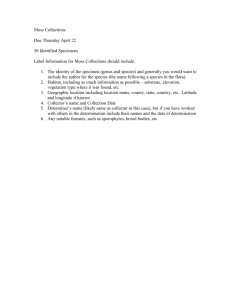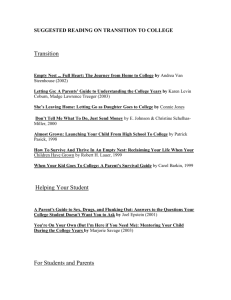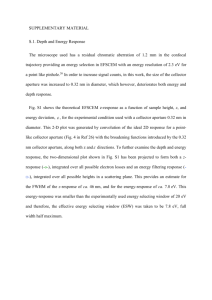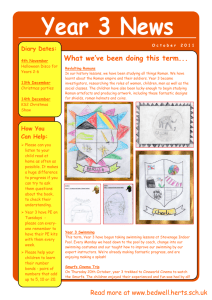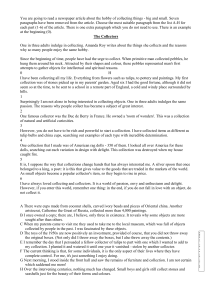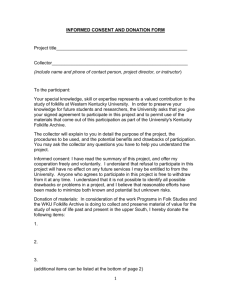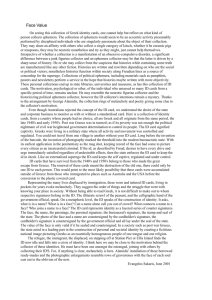Collector - Text Journal
advertisement
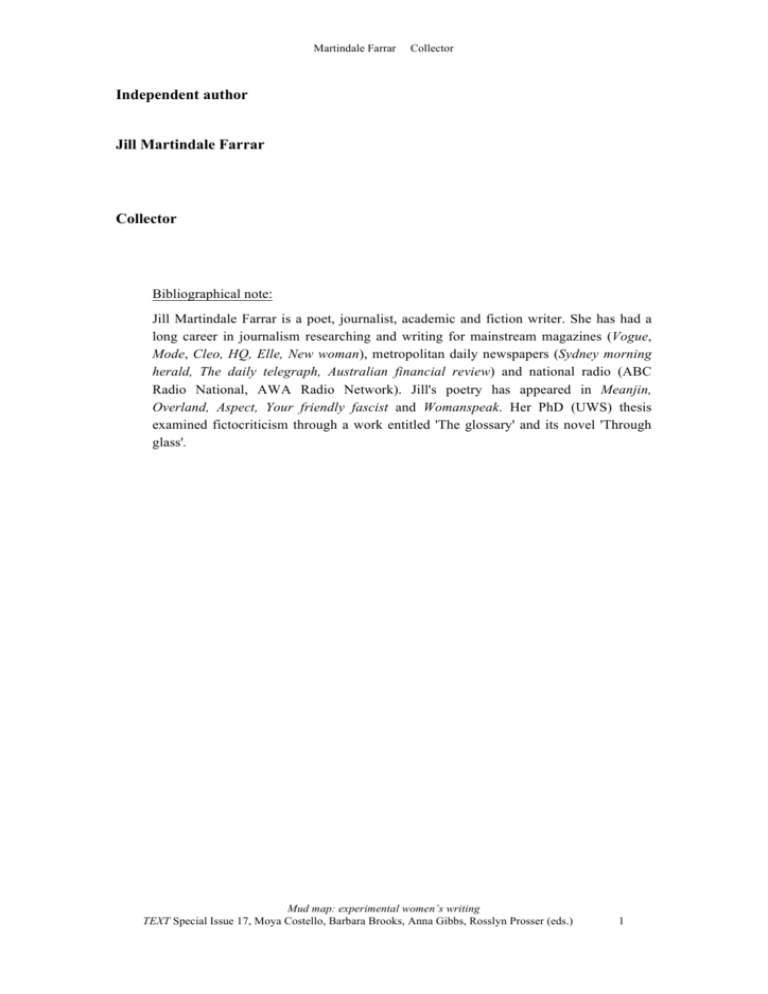
Martindale Farrar Collector Independent author Jill Martindale Farrar Collector Bibliographical note: Jill Martindale Farrar is a poet, journalist, academic and fiction writer. She has had a long career in journalism researching and writing for mainstream magazines (Vogue, Mode, Cleo, HQ, Elle, New woman), metropolitan daily newspapers (Sydney morning herald, The daily telegraph, Australian financial review) and national radio (ABC Radio National, AWA Radio Network). Jill's poetry has appeared in Meanjin, Overland, Aspect, Your friendly fascist and Womanspeak. Her PhD (UWS) thesis examined fictocriticism through a work entitled 'The glossary' and its novel 'Through glass'. Mud map: experimental women’s writing TEXT Special Issue 17, Moya Costello, Barbara Brooks, Anna Gibbs, Rosslyn Prosser (eds.) 1 Martindale Farrar Collector I am a collector. Contemplative. A collector of words. Calabash. Nougat. Say them over to yourself. Run them round your mouth. Con-tem-pla-tive. A flamenco tirade interrupted by 'pla' – a 'who cares' light as poof. Ca-la-bash. A word I just want to sink my teeth into. And Nou-gat. So dense one's jaw gets stuck half way through. I know they are just words, as my Ex would say. Yet words at times seem all I have, seem all I'm made of. They protect me and comfort me. They lull me to sleep at night and cast a spell on me as I gaze out at the Gardens at lunch Words are the black and white of a nun's robes, with all the shades and feelings contained within the habit, pun intended, of common usage. Though I realise most words, ultimately, need to go together to generate meaning. There is something spare and arresting about certain singular words. Oberon – They don't – Opulent – go in any – Ostrich – specific order. But I play with different combinations, as a thief at a locked safe. Oberon, oberon, ostrich, etiquette Vellum, dumpling, taboo. They are song lyrics, they are polaroids. They are chess pieces, worrybeads and dice. Nonsense, my Ex would say, they are just words. My Ex is my former husband – an expression I find myself trotting out more and more as if to justify whole swathes of misdemeanours. He would have made this pronouncement, just words, as though they were two distinct entities: Just. Words. 'Just' as in merely, never 'just' as in mot juste. He would have thrown the phrase up, the way people throw up their palm, speak to the hand, after I had let slip my enthusiasm for some new moniker like a kid who finds a birds nest on the way home from school. Parasol. I might have said to him across the dinner table. With a deep breath I might have exhaled adamantine, or, glitter. Just saying them would bring a smile to my lips and the corners of his mouth would draw in. His shoulders would do a small upturned semi-circle to show me he was trying to be patient. Trying not to sigh. The size of the semi-circle would be in direct proportion to my enthusiasm. The greater my birds nest, the tighter his coil. It would take huckleberries or etiolated for him to look at his watch and push his plate away, suggest we move to the living room. Being a words person in his estimation put me on a par with next to useless. They wouldn't Mud map: experimental women’s writing TEXT Special Issue 17, Moya Costello, Barbara Brooks, Anna Gibbs, Rosslyn Prosser (eds.) 2 Martindale Farrar Collector help in an emergency, he would patiently point out paring his toenails; they won't change anything. Patient, I said, is an interesting word. ~ Each day I take my sandwich into the Gardens at the bottom of the sandstone cliff, and take off my shoes to feel the cool grass under my feet. Talisman. Marzipan. Date. No matter if I take an early or late lunch, there are always joggers plying back and forth in counterpoint to the ferries on the harbour. I have no objections to conversation and company, but mostly what I crave in the middle of a working day is some middle distance to stare into. A neutral backdrop on which to page through my collection of words. Not just any words. Not just empty words. Words that seem to promise something – something always tantalizingly just out of reach. Casbar. Cantilever. Cadeaux. It is often a wrench to take myself back to the office and temporarily leave my words and the Gardens behind. At work it is all about parties. As in, 'the relationship between the parties', and, 'the parties expressly excluded' subject to and hitherto aforementioned. The parties have agreements, arrangements and termination dates. They have voidable terms, they have waivers and most of all entitlements. In my book, 'entitlements' would be small things passed on trays at Friday night drinks. Another entitlement with your martini, madam? In reality they're bulleted lists printed without thought for aesthetics, tonality, nor shape, nor form. They are like very badly (I almost wrote 'baldly') choreographed sequences. They are bulkily put together. They move in ungainly ways from hyperextended clauses defining what they are not, to accusatory statements of fatuousness. My editing hand hovers in despair over a page that has neither the momentum of a pirouetting ballerina nor the definitive gesture of a work of Noh. These pages are like watching someone uncoordinated jog. Sometimes I would have liked to have been a painter. Or a dancer. Or a bird. Something more succinct, more defensible than a words person. Because there are always words one should have said and ones one shouldn't have. And yet I am paid to be a words person. Paid to what they call wordsmith things – pieces of other people's text, other people's poorly thought out meanings. 'Just go away and wordsmith this for us would you,' they say and I obediently shuffle back to my cubicle. Individual words have for me a beauty and melody to them which resonate outward, like rings in a pool. Mud map: experimental women’s writing TEXT Special Issue 17, Moya Costello, Barbara Brooks, Anna Gibbs, Rosslyn Prosser (eds.) 3 Martindale Farrar Collector People are always looking for explanations for things. I want to confront the reader – by which I mean the world – with the single, isolate word. (Without prescribed explanations). I want them to feel their muscularity, their poetry. Their cool, solitary existence, that doesn't promise anything beyond. As a child I would sit on the train going home from school and try to listen to the other peoples' conversations as though they were speaking in a foreign language. The idea was to re-experience my own language as though I had just arrived from Kalamazoo. It takes effort to produce this effect through one's ordinary, everyday ears. But the process is a little like squinting to get a better look at a painting. Take 'fell'. A beautiful specimen. It seems to me it should be something verdant and mossy green. I'm probably thinking of 'fen' but I won't look it up in the dictionary or else I will lose my image of something dark and damp, but delicious – the crease between a woman's breasts, the join between buttock and thigh, the dip between hillocks, the damp earth smell of under the veranda. Fell. And yet in its most common, obvious meaning it is also superb. Fell. It is a ballet. It is a succinct history of something damaged. We fell apart, if you need the longer version. Or, even longer: we fell in love then, we fell out. But should anyone ask for my life story and say, 'but give me the brief version, I have a plane to catch', I would just say, 'Fell'. ~ We are all given a word at birth. And then other words crowd in and some words are called nonsense. We must hide some words and only display others. Soon we have whole legions of the things sloshing around inside us and we wonder that no one understands us. Though one sees words and hears words, it is the saying that really counts. Say you love me. Say we elope. The love of them is fundamentally a fusion of these other senses – seeing, hearing – and wanting to mouth them. Which is also tactile. Some words like balm or milk, melt on the tongue, thrilling the surfaces of the skin. There are those which must not be used around or close to the eyes, the lips, the mucosa: like cruel intentions or acid tongues. Those which must not be ingested or swallowed: caustic wit or withering sarcasm. The mouth is the exploratory orifice and the first point of entry to the body where we are told 'Don't': 'Don't put that thing in your mouth'. There are certain words that can only be held in the mouth in private. If I imagine my life I think of the sadness that descends on me in a hotel room, on day two, when the room has been cleaned and all trace of me has been expunged, like evidence from a crime scene, bar a few items of clothing and a toothbrush. I waited in a hotel like this once for a lover who said she would meet me there. There is something sad about a television turned down so low it sounds like the people are quietly heaving or clearing their throats. Mud map: experimental women’s writing TEXT Special Issue 17, Moya Costello, Barbara Brooks, Anna Gibbs, Rosslyn Prosser (eds.) 4 Martindale Farrar Collector No one really looks at the words or where they come from. And they always think they can do better. ~ Though I recite them like rosary, in my mind where I really see them – or really perform them – I can't get enough space around these words. I want them in a gallery, writ large or small, roman, capitalised or italic, but with vast areas of white around them. RENDEZVOUS REQUIEM HOPE. I want my words – and I think of them as my words – to command attention. I want each to be an utterance like a Rothko painting – a whole room full of Rothkos. This seems grandiose as I write it down, but it is the words which wield the power which is what I want to release. In this supposed gallery – which is more like a cloud – I want the words to have free rein. Each reader generates links between the words, creating individual story lines coalescing like raindrops or, briefly glimpsed, like rainbows, but without the pressure of having to be anything. Without being typecast. I want them proliferating various contexts – not spelled out or enclosed in the strictures of syntax (though syntax is another favourite word). ~ I recognise the irony that my fascination with words does not necessarily make me a successful communicator. Though my Ex in the middle of an argument used to say, 'It's easy for you, you're a words person', I think he exaggerated the benefits of a facility with words. I mentioned the sadness of my life if I imagine it, as I picture it, as it is. My emergent life on the other – my life as it could be, my 'cloud gallery' life if you like, where my words are suspended and yet to be yoked to a narrative – is more that of a pointed toe drawing an arc in the sand. These two lives – the as-is and the emergent – meet at the arc in the sand, the beginning of a gesture, a movement, and its erasure … The moment I can't see forward any further – the impossibility. Yet this so-called impossibility, the moment when the dancers' bodies are suspended in mid-air – this is also the great escape. This is what I'm after with my words. In this frozen in mid-air moment – where the movement's intensity is released, and also releases a kind of well-spring in the heart of the observer: my 'self'. I'm not able to explain all this very well, but just as a gorgeous sight makes one catch one's breath – is it the sheer impossibility of it or, is it, the Mud map: experimental women’s writing TEXT Special Issue 17, Moya Costello, Barbara Brooks, Anna Gibbs, Rosslyn Prosser (eds.) 5 Martindale Farrar Collector reality of its materialization – this 'impossibility', what the dance world calls balon (a quality of elevation like a bouncing ball, which cannot be taught) is what I want to capture in words. In some new form of expression. And I am trying hard not to ask a question. Life seems to pose imponderables and I am tired of that whiny tone and messy appearance of a whole pile of questions. They never come as one neat Q and A. Nothing that can be laundered, ironed and stowed in a drawer. What am I trying to express? Each word is a drama … and yet … focussing on the words not the sequences of events, I can fondle and shuffle them, polish and improve on what might have been. Everything I fall in love with is impossible … what therapists call magical thinking. I realise I am being contradictory. On the one hand I complain about these, I hesitate to call them, documents on which I labour from 9 to 5 to drag them kicking and screaming into some semblance of eloquence, and then in the context of my own words I want the reader to simply appreciate them, to be struck by their justness. Why can musicians play with notes and I must make sense? There I've asked another question. The fairy door is open and I'm falling down the dell, the well, into the fell and all the questions have come tumbling out. Why didn't you show up? Why did you hang up? Why don't you love me? And Why am I not surprised? But if I write 'why' and leave it without its accompanying punctuation mark '?' then it regains a pleasant musicality. It becomes a firm down beat – WHY – with a slight twang at the end – why – the visual coiled tail of the 'y' on the end of the script satisfyingly echoing the way the jaw and tongue retract in the enunciation of it. It is no longer the querulous, persistent annoying little creature, 'why?' I want my gallery to be a place of refuge for the perplexed, the discombobulated, the etiolated. People sick of being told they have a communication problem. I want my words to screw the 'reader's' patronising smile and savage their right to remain silent. I want to puncture their pallid obfuscation with some sharp, pungent words. But between the entreaty and the articulation, between the dancer's jetée and arrival en pointe, there is the impossibility of ever knowing what was meant or said. Fabric. Collector. Balloon. Mud map: experimental women’s writing TEXT Special Issue 17, Moya Costello, Barbara Brooks, Anna Gibbs, Rosslyn Prosser (eds.) 6
